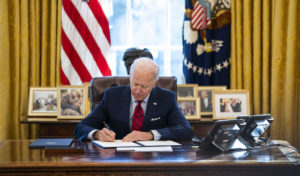
Appeals court finds the CFPB’s structure unconstitutional, the FTC proposes civil penalties for impersonation, and more…
IN THE NEWS
- The U.S. Court of Appeals for the Fifth Circuit held that the funding structure of the Consumer Financial Protection Bureau (CFPB) is unconstitutional. Under the current funding mechanism, the CFPB receives its funding through the Federal Reserve, not through a congressional provision of budget authority to the agency. The court stated that Congress shirked its duty to provide agency budgets in violation of the separation of powers by approving this arrangement. Legal experts predict the CFPB will ask for a stay in the proceedings while it seeks an appeal to the entire Fifth Circuit and, if necessary, the U.S. Supreme Court.
- The Federal Trade Commission (FTC) proposed a rule that would increase penalties for the impersonation of government and business entities. The FTC commented that the practice of impersonating government and business entities has defrauded consumers through various unfair and deceptive means. Although such impersonation is already unlawful, the FTC noted that impersonation remains prevalent, and the proposed rule would add civil penalties for impersonation. The FTC concluded that the rule would make it easier for victims to obtain monetary remedies and strengthen deterrence of impersonation fraud.
- The U.S. Department of the Interior issued a request for comments on a proposed rule to update regulation under the Native American Graves Protection and Repatriation Act. The rule would change the process for disposition and repatriation of Native American cultural items and human remains by reducing duplicative language and condensing guidelines into a clear step-by-step process. The new rule would also require museums and federal agencies that are in possession of these cultural items and human remains to consult with Indian Tribes to incorporate Native American customs in treatment and handling. Assistant Secretary for Indian Affairs Bryan Newland stated that the law is important because it empowers “Tribes to protect what is sacred to them.”
- The Federal Deposit Insurance Corporation (FDIC) issued a final rule raising the amount lenders must contribute to a fund that protects consumers against bank failures. The FDIC noted that the increase was necessary because the amount of money that banks placed in this emergency fund has not kept pace with higher levels of consumer savings during the pandemic. As a result, the ratio between the emergency funds and total amount of insured deposits fell below the minimum legal standard. FDIC Acting Chairman Martin J. Gruenberg emphasized that this change is a “modest increase” that “should not impact lending or credit availability in any meaningful way.”
- The U.S. Department of Agriculture (USDA) proposed new regulatory measures to control and reduce salmonella outbreaks in poultry products. In its proposal, USDA included several quality control measures, such as requiring that all flocks be tested before entering production facilities. Sandra Eskin, USDA Deputy Under Secretary for Food Safety, acknowledged that salmonella in poultry “is a complex problem with no single solution” but emphasized the Department’s belief that these steps will prevent infections.
- The U.S. Department of Justice filed six lawsuits on behalf of the U.S. Food and Drug Administration (FDA) to prevent e-cigarette manufacturers from selling and producing e-cigarettes. The six manufacturers allegedly violated the requirement to obtain authorization from FDA before going to market. Brian King, director of FDA’s Center for Tobacco Products, called the enforcement actions “a significant step for the FDA in preventing tobacco product manufacturers from violating the law.”
- The U.S. Department of Health and Human Services, through the Centers for Medicare & Medicaid Services, approved Arizona’s proposed Medicaid demonstration, which plans to target health-related social needs such as housing support services. Demonstrations are projects designed to accomplish Medicaid program objectives. Arizona’s demonstration will include services for stable housing, transitional housing, case management, and related education. The Center noted that these housing interventions could improve access to health care because of the effect that unstable housing has on both an individual’s health and on large scale health inequity.
- The City of Philadelphia released regulations and requirements for streetery licenses, which allow restaurants to operate outdoor dining spaces. The city had previously permitted a temporary outdoor dining program under an emergency authorization, and the new regulations made the program permanent. The regulations specified which types of businesses and spaces are eligible to use streeteries and set out requirements for physical outdoor dining structures. The city also emphasized that the majority of outdoor structures established during the pandemic will need to be removed or altered to comply with the new standards.
WHAT WE’RE READING THIS WEEK
- In a recent article in the Georgetown Immigration Law Journal, Liz Bradley, visiting practice assistant professor at University of Pennsylvania Carey Law School and Hillary Farber, professor at University of Massachusetts Law School, argued that determining credibility in immigration hearings over video teleconference (VTC) is unreliable and unfair. The Executive Office for Immigration Review has issued a memo encouraging VTC to be used in all possible hearings. In asylum cases, credibility–which can be assessed by an applicant’s demeanor including fidgeting or eye contact–is essential to being granted asylum, according to Bradley and Farber. Bradley and Farber explain that it is difficult to interpret body language over VTC, which is made visible by the fact that immigrants requesting asylum over VTC hearing are 30.6 percent more likely to be issued an order for deportation than those with in-person hearings. Bradley and Farber suggest Congress eliminate the use of demeanor to assess credibility in VTC hearings altogether.
- In a Brookings Institution working paper, Timothy G. Massad, a senior fellow at Brookings, and Howell Jackson, professor at Harvard Law School, proposed a path for regulating the cryptocurrency industry that would not require congressional action. Massad and Jackson argued that the U.S. Securities and Exchange Commission should partner with the Commodity Futures Trading Commission to create a new self-regulatory organization funded by industry participants. Specifically, Massad and Jackson outlined that this private organization would create standards for the cryptocurrency industry and be subject to regulatory oversight. Massad and Jackson contended that this approach would avoid jurisdictional disputes between agencies or litigation to determine if cryptocurrencies are commodities or securities.
- In a forthcoming Arizona State Law Journal article, Christopher Odinet, University of Iowa College of Law professor, Nikita Aggarwal, postdoctoral research fellow at UCLA School of Law, and D. Bondy Valdovinos Kaye, postdoctoral research fellow at the University of Leeds, argued that financial regulators should analyze consumer finance content on social media, called FinTok, as a method to help regulations keep pace with emerging trends. Odinet, Aggarwal, and Kaye contended that new consumer finance trends that emerge on FinTok may be risky for consumers, which increases the usefulness of monitoring such trends for regulators. Analyzing these trends through data collection and study, the authors further argued, could be a useful tool for consumer financial regulators who supervise the market.
EDITOR’S CHOICE
- In an essay in The Regulatory Review, Joseph A. Ingrao, Philadelphia Clean Air Council fellow, argued that performance-based ratemaking for utility pricing could be a mechanism to promote racial equity in energy markets. Ingrao emphasized that traditional costs of service rate setting can disproportionately affect communities of color who often have higher energy costs. Performance-based ratemaking, Ingrao contended, can use data about geographical energy usage and cut energy providers’ revenue requirements in areas that have higher energy burdens. Ingrao concluded that performance-based ratemaking could be a tool to remove the incentives for energy providers to penalize high-energy burden areas.



